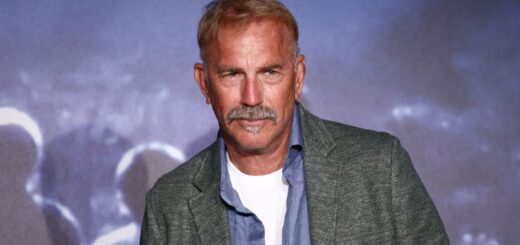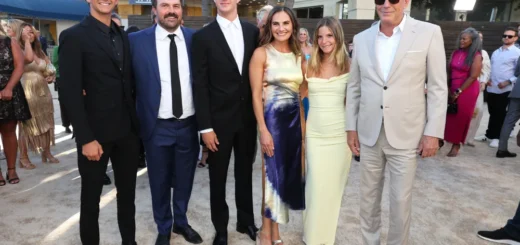Where I Really Grew Up: Reminiscing with Kevin Costner About Life in Ventura
Where I Really Grew Up
Reminiscing with Kevin Costner About Life, Music, and Giving Back to Ventura
When it comes to celebrities who’ve called Ventura County home, one name nearly always comes to mind: Kevin Costner. While most locals know he lived here at some point, many don’t realize just how deeply rooted his connection is. Costner spent a large portion of his adolescence not only in Ventura but also in Santa Paula and Ojai.
When the Thomas Fire devastated the region in December, Costner felt compelled to step in. Now, he’s returning to Ventura to give back—performing with his band Modern West at the Thomas Fire Benefit Festival this Saturday at Plaza Park. The goal? To raise funds and show support for the community still grappling with the aftermath.
During a short break from vacation before beginning a new film, Costner spoke with us about his childhood in Ventura, the importance of community, and a personal brush with tragedy on tour.
You’re about to start filming a new movie. What’s it about?
Costner:
It’s based on a true story—about a Texas Ranger who served in the late 1800s and eventually became a private security agent. He was brought out of retirement in 1934 to help catch Bonnie and Clyde. He lived across two very different centuries: on horseback with Native Americans, and later, chasing criminals in cars.
What’s it like portraying historical figures in today’s Hollywood?
Costner:
This one’s especially interesting. The original Bonnie and Clyde movie came out when I was living in Ventura. I think it was around 1968 or ’69, back when I was attending Cabrillo Junior High. It’s wild to think about how that story stuck with me—and now, here I am, part of it. Life has a funny way of circling back.
Tell me more about your time growing up in Ventura. You have a strong connection here.
Costner:
I was born in Compton and lived there until I was about six or seven. Then we moved to Upper Ojai, near a little schoolhouse on Topa Lane. That move—from the inner city to nature—was magical. I played Little League in Santa Paula and went to a Christian day school there.
Later, my dad—who worked for Edison—got transferred to Thousand Oaks. But he chose to live in Ventura. He didn’t buy our house—he traded for it. A straight home swap. We lived off Wells Road in a small tract home.
I went to Saticoy Elementary for three years, then Cabrillo, even though I thought I’d be going to Balboa. There was a big push to equalize schools. After that, I expected to go to Ventura High, but I ended up at Buena. So yeah, I was a Bulldog, not a Cougar [laughs].
By the time I was in 10th grade, we moved again. Each of my last three years of high school were spent in different schools—and later, a different college. But when people ask me where I grew up, I always say Ventura.
Did you get into acting while you were here?
Costner:
Not acting, but I sang in a boys’ traveling choir and studied classical piano for four years. Music was a huge part of my life. It was the ’60s—Motown, The Doors, The Youngbloods, Carole King, James Taylor, Jim Croce—all those artists were part of my world.
I remember one night, walking through the hills near my home off Wells Road, and I heard this garage band playing. I was 12 or 13. I doubled back just to listen—it was “Born to Be Wild.” That song stuck with me. It’s shown up in a few of my films. I’ve always been drawn to the classics, the songs that last.
I grew up on Nirvana, but also bonded with Led Zeppelin and The Doors. I once met Robert Plant and he made fun of my name.
Costner:
That’s disappointing. We build up these ideas about people, and then sometimes the experience doesn’t match. Who knows—maybe he was having a bad day. Or maybe not. Fame can warp people, but I don’t think you were the problem.
Have you visited the fire-damaged areas in Ventura County?
Costner:
Yes. I went on my own. We were evacuated—our home, and also my daughter’s home in Ojai. She was pregnant at the time. It was terrifying. We were lucky—we came back 15 days later. Others weren’t so lucky.
After the rains, we opened our homes to a few displaced families. I drove through Santa Paula, Wheeler Canyon, and other areas just to see for myself. It’s different when you witness the damage firsthand.
We only lost two lives during the fire, but the mudslides that followed were devastating.
Costner:
We knew people who were rescued from their homes—some from their rooftops. A realtor we were working with died in the Montecito mudslides. It’s not six degrees of separation—it’s one.
And it’s been hard for the kids too. Schools were shut down. Families had to make tough choices fast—leave, stay, evacuate, rebuild. That’s why we’re doing the benefit concert. We can’t fix it all, but we can show up. We can stand together.
You’ve been through tragedy on tour as well, right?
Costner:
Yes. We were on stage when a stage collapse happened. We weren’t playing yet—we were next. The stage literally fell on me. A steel girder pinned me down inside a netting material—it felt like a burglar mask. My manager needed 53 stitches. One of my bandmates was injured. People died.
We went back a year later and performed. We felt like we had to. Music can offer healing, even if it’s just for a moment.
Are you a songwriter too?
Costner:
I write, though the other guys in the band are better at it. We’ll be performing a song I co-wrote called “The Last Time”—it’s about my dad. You realize there’s always going to be that last time, and you never know when it is.
There’s also “The Sun Will Rise Again,” which speaks to tragedy and hope. We’ll probably do “Stand Strong” too. I’ve been thinking hard about what songs to include. I just want people to feel connected. That’s what this is really about.
It’s easy to feel helpless watching all this loss unfold. Hopefully, your music brings people together.
Costner:
That’s the idea. That’s why I started the band 14 years ago—I didn’t want to just go places and get snapped in photos. I wanted to do something that meant something. And this, right now, is exactly what I hoped for.
We’ll see you Saturday. Thanks for writing about it. That’s your role—and it matters. We all use the skills we have. This is what we do.


